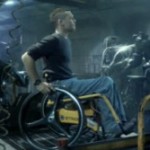Brokenness & Sin in AVATAR
![]() In James-Cameron’s groundbreaking, record-shattering, world-building film Avatar (see Cinemagogue’s introduction) we begin the fantastical journey en route to planet Pandora. Except for Jake Sully’s hyper-sleep flashbacks we never see the planet Earth, and even these are tight camera shots focused on his twin brother’s death and cremation. We know little about the state our world is in, save for a few comments that we’ve depleted its resources and essentially wrecked it. For viewers, what is carried across the galaxy from our world to this new world is not the state of the Earth, but the “state of Jake”.
In James-Cameron’s groundbreaking, record-shattering, world-building film Avatar (see Cinemagogue’s introduction) we begin the fantastical journey en route to planet Pandora. Except for Jake Sully’s hyper-sleep flashbacks we never see the planet Earth, and even these are tight camera shots focused on his twin brother’s death and cremation. We know little about the state our world is in, save for a few comments that we’ve depleted its resources and essentially wrecked it. For viewers, what is carried across the galaxy from our world to this new world is not the state of the Earth, but the “state of Jake”.
“A new life awaits you in the Off-world colonies! A chance to begin again in a golden land of opportunity and adventure!” As the world-weary Rick Deckard stared skyward at advertisements promising new life in Blade Runner, Jake Sully has decided to take up a similar offer in Avatar. Why does he leave everything he knows? The first thing we understand about Jake’s experience is that he is a man marked by brokenness and death. As  viewers, we see him watching his deceased brother (a mirror image of himself) boxed and burned with little emotion or concern from those around him. It’s a bleak beginning reminding Jake and the viewer of the fate of all flesh:
viewers, we see him watching his deceased brother (a mirror image of himself) boxed and burned with little emotion or concern from those around him. It’s a bleak beginning reminding Jake and the viewer of the fate of all flesh:
All flesh is grass, and all its beauty is like the flower of the field. The grass withers, the flower fades… surely the people are grass. – Isaiah 40:6-7
After this cheerless, front-loaded reality that comprises the film’s preamble, our protagonist’s feeble, useless legs are the additional thing we understand about former marine Sully; he’s literally experienced “brokenness” in a profound and very physical way. The world has left him crippled, and while he still exerts a strong will, the viewer can sense a root of bitterness growing in him toward his condition and those around him. He lacks direction and hope, powerless to remedy  his own shattered state. While most viewers don’t literally connect with the physical brokenness Sully has experienced, it’s an immediate way to establish a connection with paralyzing emotional damage we’ve suffered in life, in addition to those who’ve experienced physical suffering as well. The psalmist, David, felt similarly forsaken by God when he wrote:
his own shattered state. While most viewers don’t literally connect with the physical brokenness Sully has experienced, it’s an immediate way to establish a connection with paralyzing emotional damage we’ve suffered in life, in addition to those who’ve experienced physical suffering as well. The psalmist, David, felt similarly forsaken by God when he wrote:
I am poured out like water, and all my bones are out of joint; my heart is like wax; it is melted within my breast; my strength is dried up like a potsherd, and my tongue sticks to my jaws; you lay me in the dust of death. – Psalm 22:14-15
While death, loss and brokenness might suggest a protagonist in the role of “victim”, someone who has been wronged – by men, by the world, by fate, what have you – one can’t overlook Jake’s culpability as well. While he may have chosen the trip to Pandora in a moment of directionless despair (not simply regarding his brother and his legs, but his life-compass) he reveals himself to be a self-seeking opportunist. There is something creepily “off” about the muscle-riffic Colonel Quaritch (besides obviously being a descendant of R. Lee Ermey) and yet the dangling carrot of getting his legs back tempts Jake to compromise morals and mission for his own sake at what he knows, deep down, is at the expense of others.  Future repentance doesn’t negate the fact of what he is at the film’s beginning… not only broken, but another contributor to the ongoing problem of sin and pain that has been rolling since the beginning:
Future repentance doesn’t negate the fact of what he is at the film’s beginning… not only broken, but another contributor to the ongoing problem of sin and pain that has been rolling since the beginning:
Whoever makes a practice of sinning is of the devil, for the devil has been sinning from the beginning. – 1 John 3:8
Wisdom is better than weapons of war, but one sinner destroys much good. – Ecclesiastes 9:18
In this we see the classic state of lost man in the narrative, both wronged and wronging others – abused and abuser – linked in the causal chain of sin nature passing down generation to generation, lacking the ability to be healed physically or spiritually without some kind of intervention. Even better, in this compromised state we see even “good intentions” yield some devastating consequences in the film. Jake Sully desperately needs help, and the man he is enabled to become in Avatar – although not disconnected from his personality and force of will – is not possible without external initiation, revelation, and transformation.
Naturally, Avatar posits its own sci-fantasy remedy for Jake’s problems, but despite anything we draw from the fictional solution of this film, one can easily see how it’s easy to identify with the base introduction of the film’s flawed protagonist. We’ll look at Jake’s introduction to Pandora next, and what we can take away from the film’s otherworldly view of creation (click here).


